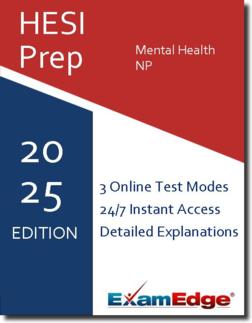HESI Mental Health NP (HesiMentalHealth) Practice Tests & Test Prep by Exam Edge - Topics
Based on 34 Reviews
- Real Exam Simulation: Timed questions and matching content build comfort for your HESI Mental Health NP test day.
- Instant, 24/7 Access: Web-based HESI Psychiatric Mental Health NP practice exams with no software needed.
- Clear Explanations: Step-by-step answers and explanations for your HESI exam to strengthen understanding.
- Boosted Confidence: Reduces anxiety and improves test-taking skills to ace your HESI Psychiatric Mental Health NP (HesiMentalHealth).

Understanding the exact breakdown of the HESI Psychiatric Mental Health NP test will help you know what to expect and how to most effectively prepare. The HESI Psychiatric Mental Health NP has multiple-choice questions The exam will be broken down into the sections below:
| HESI Psychiatric Mental Health NP Exam Blueprint | ||
|---|---|---|
| Domain Name | % | Number of Questions |
| Health Promotion and Disease Prevention | 18% | 18 |
| Assessment of Acute and Chronic Illness | 24% | 24 |
| The Nurse and Patient Relationship | 14% | 14 |
| Clinical Management | 27% | 27 |
| Professional Role and Policy | 17% | 17 |


